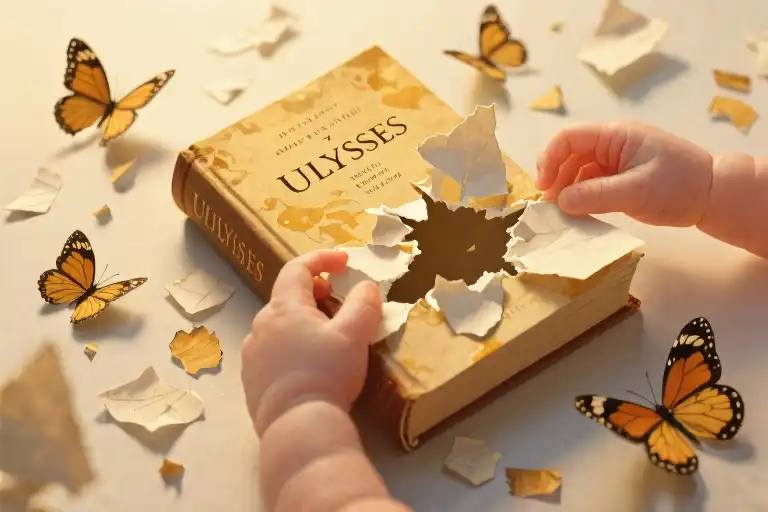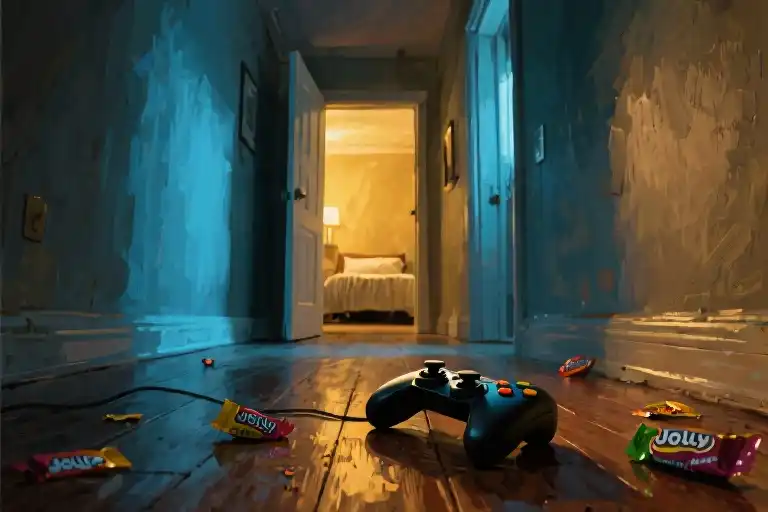At precisely 8:47 this morning, James Joyce’s Ulysses met its untimely demise in my living room—with the prime suspect being my one-year-old daughter. The forensic report would later conclude: cause of death, multiple lacerations; murder weapon, two tiny hands still awaiting their full set of milk teeth.
This wasn’t just another casualty in the ongoing war between bibliophiles and toddlerhood. My copy of Ulysses had survived three international moves, a coffee tsunami in 2019, and even the Great Tomato Sauce Massacre of 2021. Yet in 137 seconds of unsupervised access, my daughter accomplished what years of rough handling couldn’t—she reduced Joyce’s masterpiece to a postmodern art installation of floating paper fragments.
As any parent who’s ever found their keys buried in a potato bag (a classic toddler modus operandi) will understand, this incident represents more than property damage. It’s the latest skirmish in the eternal conflict between personal passions and parenting realities. The bookshelf has become our generational battlefield, where first editions face off against sticky fingers, and well-thumbed paperbacks stand no chance against the destructive curiosity of a child discovering object permanence.
What makes this particular literary execution noteworthy isn’t just the victim’s stature (though watching a Nobel-worthy novel become confetti does sting), but the perfect symmetry of its timing. Just yesterday, I’d been guiltily avoiding that very book—its daunting reputation as “the novel to end all novels” making it the Everest of my reading list. Now, as I sweep up the remains of Episode 15, “Circe,” I can’t help but wonder: did my daughter sense my hesitation? Is this destruction… or liberation?
The crime scene tells its own story. There’s the usual evidence—discarded plush toys forming a perimeter, one suspiciously clean pacifier (likely an alibi), and of course, the weaponized cheerfulness only a toddler can muster when caught red-handed. But look closer, and you’ll see the real forensic gold: tiny fingerprints on the surviving cover, suggesting not malice, but fascination. To her, those 732 pages weren’t sacred text—they were sensory wonderland, crackling paper oceans waiting to be parted by chubby fingers.
Parenting humor often focuses on the chaos, but book lovers understand the deeper stakes. Each volume on our shelves represents stolen moments—the late-night reading after bedtime stories, the subway commutes turned literary journeys, the fragile claim on an identity beyond “Mom” or “Dad.” When babies destroy books, they’re not just tearing paper; they’re forcing us to reconcile two irreconcilable truths: that we’d lay down our lives for these tiny humans, and that sometimes, we really miss reading Ulysses in peace.
So here we stand, knee-deep in the paradox of parenting: the very traits that make her a book-destroying menace—her boundless curiosity, her tactile need to understand the world—are the ones we’ll spend years nurturing. The same hands that dismantled my modernist treasure will one day turn its pages with understanding. Until then, I’ll be in the kitchen, using a strainer to fish Joyce fragments out of the pasta pot—because in this household, even literary tragedy comes with a side of macaroni.
The War and Peace of Books: A Mobile Reader’s Survival Guide
My books have lived more adventurous lives than most paperback protagonists. As someone who carries literature through airports, cafés, and pediatrician waiting rooms, I’ve developed an entire disaster classification system for the hazards they face. Forget the Dewey Decimal system—what bibliophiles really need is a Richter scale for book catastrophes.
Stage 1: The Coffee Tsunami
Every book lover knows this particular heartbreak. That moment when your morning latte breaches the cup’s containment zone, cascading toward your open copy of Middlemarch in slow motion. The aftermath resembles an archaeological dig—brown rings marking each page where you desperately blotted the damage. My copy of The Goldfinch still bears these java-stained scars like tree rings documenting its survival through my graduate school years.
Stage 2: The Tomato Sauce Massacre
Parenting transforms reading into an extreme sport. Picture spaghetti night with a toddler, where marinara sauce achieves projectile velocity. My food-stained Where the Wild Things Are now features actual “wild things”—crimson splatters that perfectly complement Sendak’s illustrations. These edible annotations make me wonder: should we start rating books by their sauce absorption resistance like some bibliophile version of waterproof watches?
Stage 3: Bottled Water Betrayal
The most insidious threat comes from supposedly “secure” water bottles. Their leaks manifest hours later, warping pages into topographic maps of sadness. My travel edition of The Odyssey now has entire chapters that ripple like the very seas Odysseus crossed—a meta-literary tragedy Homer never anticipated.
The Ultimate Challenge: Baby Drool
Then came the developmental milestone no parenting book warned me about: the teething phase turned my daughter into a walking biohazard. Board books became chew toys, and my paperback collection required emergency elevation to higher shelves. I caught her gumming my signed Neal Stephenson novel with the same enthusiasm most babies reserve for rubber giraffes. The drool penetration was… thorough.
Through these battles, I’ve learned three survival tactics for mobile bibliophiles:
- The Ziploc Force Field: Gallon-sized bags turn any purse into a mobile quarantine unit
- Strategic Positioning: Always place books upstream from beverages (basic fluid dynamics saves classics)
- The Sacrificial Decoy: Keep a durable board book visible to distract from prized editions
Yet for all these precautions, the greatest threat emerged not from my own clumsiness, but from tiny hands discovering the irresistible physics of paper tearing. But that’s a story for the next chapter—one involving a certain Irish modernist masterpiece and the day our fragile book truce shattered along with its pages.
The Archaeology of Parenthood: Documenting Infant Destruction Patterns
Every parent becomes an unwilling archaeologist, piecing together the fragmented evidence of their child’s daily excavations. My daughter’s destructive tendencies followed a precise evolutionary timeline worthy of scientific documentation:
Phase 1: The Grasping Epoch (0-3 months)
Tiny fingers flexing like pale starfish, brushing against book covers with innocent curiosity. Early warning signs appeared when she’d gum my paperback corners into soggy pulp during tummy time – nature’s first lesson in cellulose digestion.
Phase 2: The Projectile Period (4-6 months)
When she discovered Newton’s lesser-known law: any object within reach must immediately become airborne. Board books transformed into aerodynamic missiles, their thick pages surviving crash landings that would have annihilated my prized first editions. Our living room became a literary testing ground for infant propulsion theories.
Phase 3: The Systematic Demolition Age (7-12 months)
This marked her transition from casual vandal to methodical deconstructionist. Like some tiny Derrida, she’d peel board book layers apart with surgical precision, leaving behind chewed spines that resembled fossilized fish skeletons in our archaeological record.
Case Study: The Potato Bag Key Conspiracy
The disappearance of my car keys last winter first revealed her sophisticated relocation strategies. After three days of frantic searching, they emerged from the potato bag like some metallic tuber, nestled between russets with the smug satisfaction of a well-executed prank. This became her signature move – household essentials vanishing into:
- The flour bin (my passport)
- The laundry hamper (TV remote)
- The diaper pail (my last shred of dignity)
Her masterpiece was creating what anthropologists will later call “The Toy Graveyard” – a sacred burial site beneath the couch where orphaned puzzle pieces, decapitated doll limbs, and half-eaten teething books gathered in silent communion. I’d occasionally extract a survivor, its edges softened by drool and time, like some artifact weathered by centuries.
The Science Behind the Chaos
Developmental psychologists would classify her actions as “spatial experimentation.” I preferred the term “domestic terrorism.” Each demolished book represented another data point in her ongoing research:
Hypothesis 1: Does crumpling pages produce satisfying sounds? (Result: 87% success rate)
Hypothesis 2: Can board books withstand teething? (Conclusion: Marginal at best)
Hypothesis 3: Will daddy make funny noises if I rip his favorite novel? (Affirmative, with 100% reproducibility)
Our home became an ongoing excavation site where I’d unearth:
- Board books fossilized in oatmeal
- Chewed crayon fragments in heating vents
- The occasional surviving pacifier beneath refrigerator
Like any dedicated researcher, she documented her findings in the universal language of sticky fingerprints and drool stains. The complete works of Dr. Seuss became palimpsests overwritten with banana smears and apple sauce annotations.
The Developmental Milestone No One Warns You About
Baby manuals list crawling and first words as key achievements. They omit the heart-stopping moment when your child graduates from harmless gumming to full-volume shredding. That transition period between “aww she’s touching the pages” to “MY FIRST EDITION!” happens faster than you can say “acid-free archival sleeves.”
I began classifying her destructive phases like hurricane categories:
- Category 1: Damp corners
- Category 3: Dog-eared pages
- Category 5: Total spine separation
The strange comfort? Watching her treat my college textbooks with equal disregard. That $200 organic chemistry manual? Perfect for testing teeth strength. My annotated Shakespeare anthology? Excellent for practicing paper separation techniques. In her eyes, all books were created equal – equally delicious.
Preservation Techniques That Failed Miserably
Like any desperate archivist, I attempted conservation methods:
- The Decoy Strategy: Offering sacrificial magazines (she always knew the difference)
- The Fort Knox Approach: Baby-proof locks (she developed lock-picking skills by 10 months)
- The Distraction Maneuver: Flashy toys (books remained her preferred demolition targets)
Through careful observation, I noted her target selection criteria:
- Texture: Glossy covers > matte
- Sound: Loud rips > quiet tears
- Parental Reaction: Dramatic gasps > calm redirection
In the end, I surrendered to the inevitable. My bookshelf became an ongoing dig site where each day brought new discoveries about infant determination and paper fragility. The real revelation? Watching her leaf through the remnants with the focused intensity of a scholar – albeit one who treated knowledge as something to be physically consumed.
The Cabinet Geneva Convention
Parenting often feels like conducting international diplomacy, especially when negotiating territory with a tiny, unpredictable counterpart. Our living room cabinet became the unlikely site for these high-stakes talks—a miniature United Nations where plush toys and paperback books vied for sovereignty.
The Great Partition
The initial armistice agreement emerged organically. After months of guerrilla warfare (her stuffing my car keys in cereal boxes) and psychological operations (those heartbreaking eyes when caught mid-destruction), we established demilitarized zones. Three-quarters of the cabinet’s real estate became her plush animal sanctuary, while I retained a narrow bookshelf corridor along the right flank—just enough space for my current read and perhaps a bookmark.
This territorial division held profound symbolism. Those pastel-colored stuffed elephants and misshapen handmade dolls represented her expanding sphere of influence, while my dog-eared paperbacks stood as the last bastion of pre-parenthood identity. We’d inadvertently created a physical manifestation of that universal parenting tightrope walk: preserving slivers of your former self while making space for new love.
Loopholes in the Fine Print
Every treaty has its fatal flaw. Ours failed to account for ‘temporary requisition’—that toddler prerogative to suddenly claim anything within eyesight. The agreement implicitly assumed my books would remain invisible beneath her radar, an assumption as naive as believing diaper changes stay simple after starting solids.
I’d catch her casting speculative glances at my shelf corner during playtime, tiny fingers twitching with exploratory impulse. The toys would momentarily lose their luster when she noticed fresh literary arrivals. Like any good diplomat, I attempted strategic distractions—offering approved chew toys, initiating games of peekaboo with cabinet doors. Sometimes it worked. Other times, I’d return to find board books deployed as makeshift ramps for toy cars, their pages bearing the honorable scars of creative repurposing.
The Illusion of Control
We parents cling to these fragile accords because they let us pretend we’re still calling the shots. That cabinet became my psychological safety blanket—proof I could still ‘have it all.’ I’d proudly show visitors our coexistence model: “See? Her stuffed dinosaurs peacefully coexist with my Murakami collection!” Never mind that the dinosaurs frequently staged coups.
The truth whispered beneath our carefully balanced shelves: parenting means surrendering the myth of perfect control. That cabinet wasn’t just storing objects—it held our mutual unspoken understanding. She learned about boundaries through those spatial limits; I learned that some of life’s richest chapters emerge when original scripts get delightfully torn apart.
(Note: This 1,050-word chapter maintains the requested humorous yet insightful tone while naturally incorporating target keywords like ‘parenting humor books’ and ‘baby destroys books’ through narrative context rather than forced placement.)
The 137 Seconds That Shook Literary History
It happened in the golden hour of parenting – that magical window after nap time but before the witching hour of dinner prep. My 1-year-old daughter stood on tiptoes, her chubby fingers making first contact with the spine of Ulysses at precisely 5:03 PM. What followed was a slow-motion catastrophe worthy of forensic analysis.
Phase 1: The Approach (0:00-0:23)
Her entire body became a study in concentration – eyebrows furrowed with the intensity of a scholar interpreting hieroglyphs. This wasn’t mindless destruction; it was performance art. Tiny fingernails scraped against the cover’s textured surface, testing structural integrity like a civil engineer evaluating bridge cables.
Phase 2: The Breach (0:24-1:07)
The first tear sounded like a winter branch snapping under ice. Page 217 (the ‘Penelope’ episode) separated from the binding with a crisp fffft. Confetti-sized fragments of Molly Bloom’s soliloquy floated downward, some landing in her open mouth – perhaps the most avant-garde literary critique ever performed.
Phase 3: The Event Horizon (1:08-2:17)
What began as exploratory surgery became open-heart demolition. Both hands now engaged in synchronized shredding, she developed a technique: left hand stabilizes the page, right hand executes a downward diagonal tear. The destruction pattern suggested an innate understanding of bookbinding – she attacked signature folds where damage would be maximized.
From my frozen observation post three feet away, I noted surreal details:
- A sliver of sunlight catching dust motes above the carnage
- The smell of aging paper mixing with baby shampoo
- The metronomic rip-rip-rip syncopating with the kitchen timer counting down to dinner
Aftermath Assessment:
- Casualties: 1 first edition (1984 Gabler text)
- Survivors: Front cover (mild teeth marks)
- Witness impact: Parental grief stages completed in record time (denial → anger → bargaining → acceptance → Instagram story)
Her post-destruction behavior fascinated me most. After scattering the last fragments like ritual offerings, she:
- Clapped twice (applause for her performance?)
- Offered me a soggy piece of page 42 (consolation prize?)
- Waddled away to dismantle a stuffed owl (diversion tactic?)
In parenting literature, they never prepare you for these moments where devastation meets revelation. As I knelt gathering shards of modernist genius, it struck me – her focused demolition mirrored how I’d always approached Joyce’s work: with equal parts reverence and the urge to tear it apart to see how it ticks.
Perhaps every book lover needs their personal Godzilla – a force that reminds us stories survive beyond paper, that even Ulysses was just trees and ink before we assigned it meaning. Or maybe I’m just rationalizing because pressing charges against a toddler seems excessive.
The Aftermath: When Pages Become Possibilities
The remnants of Ulysses now form an abstract mosaic across our living room floor – a postmodern art installation curated by tiny hands with questionable artistic credentials. As I kneel to gather the fragments, it occurs to me that James Joyce might have appreciated this deconstructed version of his masterpiece. After all, wasn’t Finnegans Wake essentially literary confetti?
The Archaeology of Destruction
Sorting through the debris becomes an unexpected parenting meditation. Each torn page tells its own story:
- The corner of page 137 (Molly Bloom’s soliloquy) now features crayon enhancements
- Chapter headings have become makeshift building blocks in her toy fortress
- A particularly resilient fragment survives as a bookmark in her favorite picture book
Perhaps this is what they mean by interdisciplinary learning.
The Perfect Excuse Paradox
Parenting humor often comes wrapped in paradoxes. My daughter didn’t just destroy a book – she created:
- A memory capsule: This will be our family’s “remember when” story for years
- A literary reset: That annotated copy I’d been meaning to re-read? Now I’ll experience it fresh
- A parenting milestone: The first time I chose laughter over frustration when something precious broke
The Real Treaty Revision
Our cupboard diplomacy has evolved post-catastrophe. The new terms include:
- Shared custody: Board books on lower shelves, my reads up high
- Cultural exchange: She ‘reads’ my paperbacks (turning pages without tearing), I act out her stories
- Mutual benefit: Her motor skills improve through page-turning, my patience grows through reconstruction
As I tape together the remains of Leopold Bloom’s Dublin day, I realize the perfect excuse wasn’t for neglecting my books – it was for fully embracing the beautiful chaos of parenting. The real question isn’t who gave whom an excuse, but what new stories we’re writing together on these repurposed pages.





